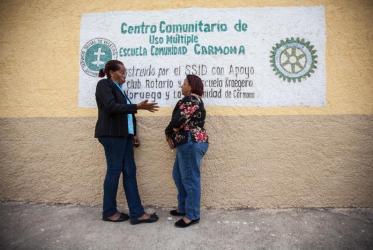Displaying 61 - 80 of 81
10 February 2016
Symposium focuses on religion, violence, extremism
04 February 2016
WCC/UN conference calls for coordinated action on refugee crisis
20 January 2016
“European solidarity must be strengthened”
29 October 2015
WCC urges responsibility for and support to the refugees in Europe
04 September 2015
WCC Executive Committee speaks out on migrant crises
12 June 2015
Church leaders address statelessness in Dominican Republic
03 February 2015
Christians around the world pray for unity
22 January 2015
Pilgrimage of justice and peace gives vision for WCC programmes
22 November 2014
Churches to be more inclusive of persons with disabilities
16 October 2014
WCC expresses condolences at death of Brother Jeffrey Gros
13 August 2013








